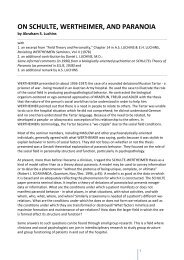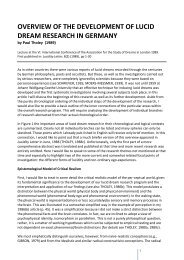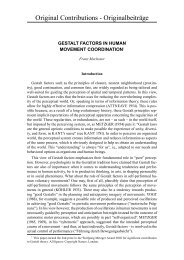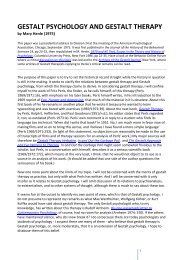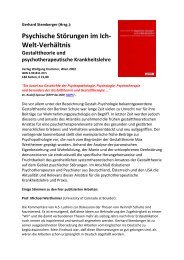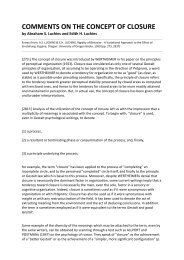Principles of Gestalt Psychology - Society for Gestalt Theory and its ...
Principles of Gestalt Psychology - Society for Gestalt Theory and its ...
Principles of Gestalt Psychology - Society for Gestalt Theory and its ...
You also want an ePaper? Increase the reach of your titles
YUMPU automatically turns print PDFs into web optimized ePapers that Google loves.
Germany <strong>and</strong> the United States are widely different. The idealistic tradition <strong>of</strong> Germany is morethan an affair <strong>of</strong> philosophic schools; it pervades the German mind <strong>and</strong> appears most openly in thewritings <strong>and</strong> teachings <strong>of</strong> the representatives <strong>of</strong> "Geisteswissenschaften," the moral sciences. Themeaning <strong>of</strong> a personality prominent in history, art, or literature Seems to the German mind moreimportant than the pure historical facts which make up his life <strong>and</strong> works; the historian is <strong>of</strong>tenmore interested in the relation <strong>of</strong> a great man to the plan <strong>of</strong> the universe than in his relations tothe events on the planet. Contrariwise, in America the climate is chiefly practical; the here <strong>and</strong>now, the immediate present with <strong>its</strong> needs, holds the centre <strong>of</strong> the stage, thereby relegating theproblems essential to German mentality to the realm <strong>of</strong> the useless <strong>and</strong> non-existing. In sciencethis attitude makes <strong>for</strong> positivism, an overvaluation <strong>of</strong> mere facts <strong>and</strong> an undervaluation <strong>of</strong> veryabstract speculations, a high regard <strong>for</strong> science, accurate <strong>and</strong> earthbound, <strong>and</strong> an aversion,sometimes bordering on contempt, <strong>for</strong> metaphysics that tries to escape from the welter <strong>of</strong> merefacts into a l<strong>of</strong>tier realm <strong>of</strong> ideas <strong>and</strong> ideals.There<strong>for</strong>e when the first attempts were made to introduce <strong>Gestalt</strong> theory to the American public,that side which would most readily appeal to the type <strong>of</strong> German mentality which I have tried tosketch was kept in the background, <strong>and</strong> those aspects which had a direct bearing on science wereemphasised. Had the procedure been different, we might have incurred the danger <strong>of</strong> biasing ourreaders against our ideas. Living in a different intellectual climate they might have taken thisaspect <strong>of</strong> <strong>Gestalt</strong> theory <strong>for</strong> pure mysticism <strong>and</strong> decided not to have anything to do with the wholetheory be<strong>for</strong>e they had had a chance <strong>of</strong> becoming acquainted with <strong>its</strong> scientific relevance.At the present moment, however, when <strong>Gestalt</strong> theory has been taken up as a main topic <strong>of</strong>discussion, it seems only fair to lift the old restriction <strong>and</strong> expose all <strong>its</strong> aspects.THE DILEMMA OF GERMAN PSYCHOLOGY OUT OF WHICH GESTALT THEORY AROSE.To do this I shall revert <strong>for</strong> a moment to the origins <strong>of</strong> our theory <strong>and</strong> to the leading ideas <strong>of</strong> <strong>its</strong>first founder, Max Wertheimer. What I said about the German intellectual climate does not applyto German experimental psychology. Rather, experimental psychology had carried on a feud withspeculative psychologists <strong>and</strong> philosophers who, not without reason, belittled <strong>its</strong> achievements<strong>and</strong> claimed that mind in <strong>its</strong> truest aspects could never be investigated by scientific methods, i.e.,by methods derived from the natural sciences.' How could, so the argument would run, the laws <strong>of</strong>sensation <strong>and</strong> association, which then composed the bulk <strong>of</strong> scientific psychology, ever explain thecreation or enjoyment <strong>of</strong> a work <strong>of</strong> art, the discovery <strong>of</strong> truth, or the development <strong>of</strong> a greatcultural movement like that <strong>of</strong> the Re<strong>for</strong>mation? The facts to which these opponents <strong>of</strong> scientificpsychology pointed <strong>and</strong> the facts which the experimental psychologists investigated were indeedso far apart that they seemed to belong to different universes, <strong>and</strong> no attempt was made byexperimental psychology to incorporate the larger facts in their system which was erected on thesmaller ones, at least no attempt which did justice to the larger.Weighing this situation in retrospect we are <strong>for</strong>ced to take an attitude similar to that which wetook with regard to the materialism-vitalism controversy. We must admit that the criticism <strong>of</strong> thephilosophers was well founded. Not only did psychology exhaust <strong>its</strong> ef<strong>for</strong>ts in trivial investigations,not only had it become stagnant with regard to the problems it actually worked on, but it insistedon <strong>its</strong> claim that it held the only key to those problems which the philosophers emphasised. Thusthe historian was right when he insisted that no laws <strong>of</strong> sensation, association or feeling - pleasure<strong>and</strong> displeasure - could explain a decision like that <strong>of</strong> Caesar's to cross the Rubicon with <strong>its</strong>momentous consequences; that, generally speaking, it would be impossible to incorporate the11



